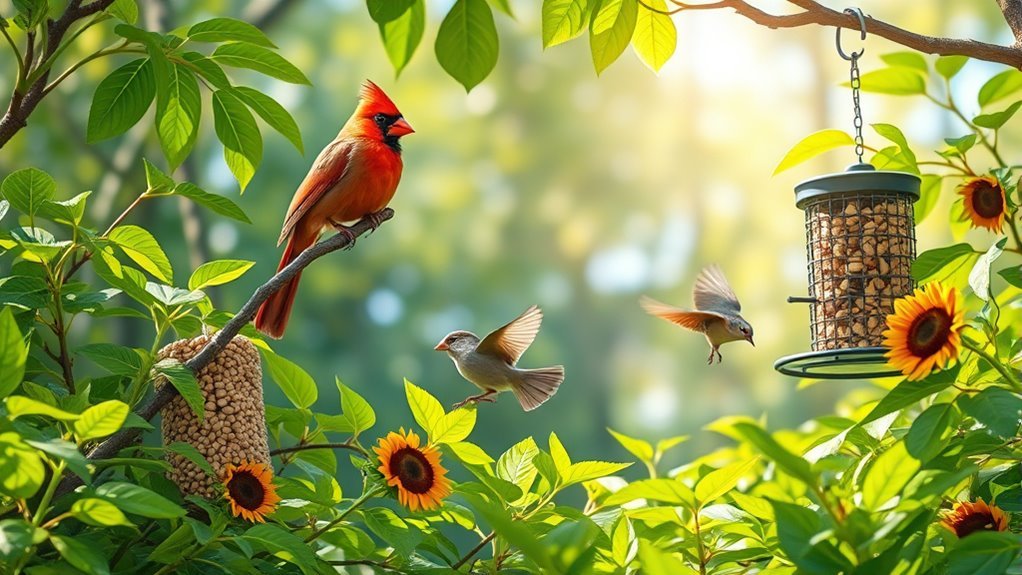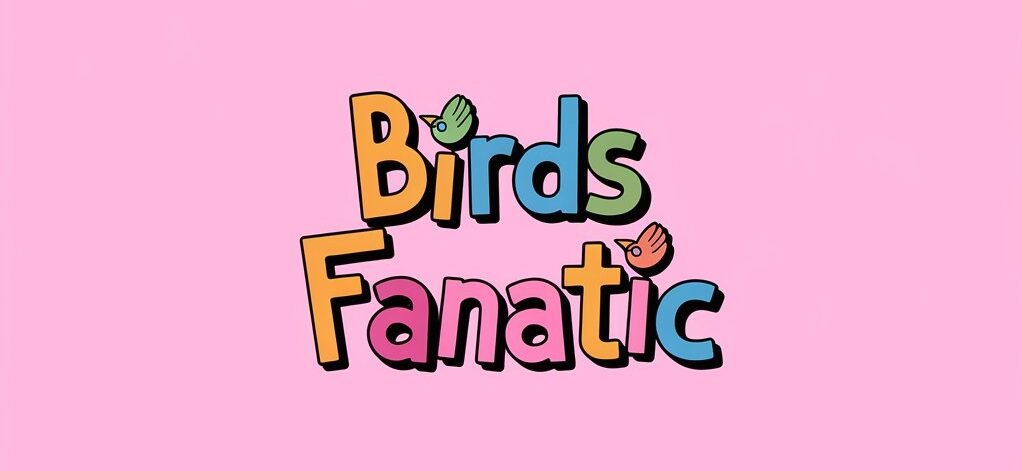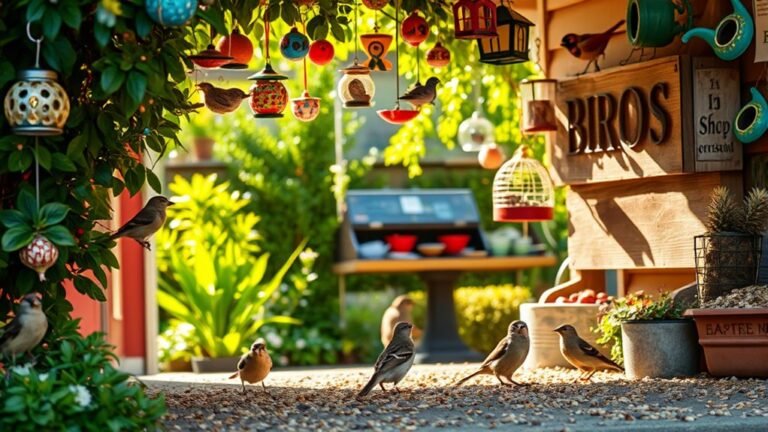South Carolina Backyard Birds
In South Carolina, your backyard serves as an important home for many bird species. You can see common songbirds like the Chipping Sparrow, which does well in cities, and the bright Yellow Warbler. You may also notice the lively Ruby-throated Hummingbird moving quickly between flowers. Learning about these birds' habits can improve your outdoor enjoyment. Their nesting habits can play a key role in your backyard ecosystem.
Key Takeaways
- Common songbirds in South Carolina include Chipping Sparrows, White-throated Sparrows, and various Warblers that thrive in diverse settings.
- Vibrant hummingbirds, especially the Ruby-throated hummingbird, are attracted to native flowers like bee balm and fuchsia in local gardens.
- Majestic raptors, such as bald eagles and red-tailed hawks, contribute to South Carolina's biodiversity and ecological balance by controlling prey populations.
- Seasonal changes bring different bird species, including Dark-eyed Juncos in winter and Warblers in spring, enhancing backyard birdwatching experiences.
- Attract birds with suitable feeders filled with sunflower seeds and provide fresh water in birdbaths for a lively backyard environment.
Common Songbirds of South Carolina

As you explore the outdoor spaces of South Carolina, you'll see a variety of songbirds that contribute to the state's bird diversity.
Common sparrows, including the Chipping and White-throated Sparrows, create distinct sounds and display interesting behaviors. They adapt well to different environments, thriving in cities and rural areas alike.
You'll also hear the pleasant songs of warblers like the Yellow and Pine Warblers, which sing to attract mates and defend their territory.
Observing these songbirds will deepen your connection to South Carolina's unique ecosystems and enhance your appreciation for nature.
Vibrant Hummingbirds to Spot
Hummingbirds add color and energy to South Carolina's gardens. The ruby-throated hummingbird is a standout species, recognized for its bright green feathers and vivid ruby throat.
These birds have a unique feeding habit; they hover near flowers or feeders and flap their wings rapidly. Their long tongues help them sip nectar, and they need to feed often to sustain their high energy levels.
To invite these beautiful birds, plant local flowers like bee balm or fuchsia. By making your space attractive, you'll enjoy watching ruby-throated hummingbirds as they flit around, bringing vibrancy and a closer connection to nature.
Majestic Raptors and Birds of Prey

Raptors soar over South Carolina with their strong wings and sharp hunting skills. These birds of prey include the bald eagle, red-tailed hawk, and peregrine falcon.
Each raptor has different hunting methods. For instance, hawks often perch quietly to watch for prey before diving quickly. The peregrine falcon uses speed to catch its target, flying at impressive rates.
Watching these stunning birds deepens your appreciation for South Carolina's natural beauty. Raptors are vital for keeping the ecosystem balanced. They control rodent populations and benefit the environment.
Attracting Birds With Feeders and Baths
To attract birds to your backyard, create a welcoming environment. Start by choosing the right seeds. Include sunflower seeds, peanuts, and a mix made for local birds. Fresh water is also important. A birdbath provides drinking water and helps birds cool off in hot weather.
- Select feeders that accommodate various birds, including small finches and larger woodpeckers.
- Clean feeders and baths regularly to avoid mold and bacteria.
- Position feeders and baths in sheltered areas to help birds feel secure.
This simple setup can encourage a diverse range of birds to visit your yard, making birdwatching enjoyable.
Nesting Habits of Backyard Birds

Backyard birds have specific nesting habits influenced by their species and their environment. Different birds prefer different nesting sites. For example, Carolina wrens like to build nests in shrubs, while bluebirds choose open cavities.
These birds use various materials for their nests, including twigs, grass, and feathers, to create safe homes.
Timing is essential for egg laying. Birds often adapt their laying cycles based on local weather and food availability. Many birds lay their eggs in the early morning.
Observing these behaviors helps you understand their nesting habits and how you can support them by creating suitable habitats.
Seasonal Variations in Bird Species
As seasons change in South Carolina, you'll notice different bird species in your backyard.
These changes often relate to migration, as many birds fly to warmer places in winter. For example, Ruby-throated Hummingbirds appear in spring but leave by fall.
Here are some seasonal bird variations:
- Winter visitors: Look for Dark-eyed Juncos and American Robins.
- Spring arrivals: You can expect Warblers and Indigo Buntings to return for breeding.
- Summer residents: Listen for the songs of Eastern Towhees and Carolina Wrens.
Knowing these patterns helps you predict the bird species you'll see.
This connection enhances your enjoyment of the lively bird community around you.
Birdwatching Tips for Beginners
Birdwatching is a great way to enjoy the variety of birds in your South Carolina backyard. Start with the right binoculars. Choose a pair with 8x to 10x magnification for the best viewing. Ensure they're comfortable to hold and steady when you look through them.
When identifying birds, focus on their size, color, and behavior. Start with common birds like cardinals and blue jays. Learn their calls to help with identification. Keep a field guide nearby. It will help you compare bird shapes and markings easily.
Be patient and quiet while watching. This creates a peaceful environment for the birds.
Connect with other birdwatchers. You're part of a friendly community that shares your interest! Enjoy your birdwatching journey!
Frequently Asked Questions
What Are Common Bird Predators in South Carolina Backyards?
In your backyard in South Carolina, you may see various predatory birds, especially hawks. These birds hunt smaller birds. Additionally, snakes and raccoons may target bird nests. These nest predators can lower the survival rates of smaller birds in your area. Protecting nesting sites is important for helping local bird populations thrive.
How Does Weather Impact Bird Behavior in South Carolina?
Weather significantly affects bird behavior in South Carolina. Changes in temperature can lead birds to migrate during winter. As weather conditions shift, birds change their feeding habits, nesting behaviors, and social interactions. These adjustments are crucial for their survival and influence the local ecosystem's balance.
What Diseases Affect South Carolina Backyard Birds?
Several diseases impact backyard birds in South Carolina. One significant disease is bird flu. This virus can lead to severe respiratory problems and high death rates among birds. Another concern is feather mites. These pests cause skin irritation and feather loss, which can harm the birds' overall health. It is important for bird owners to watch for these issues to keep their feathered friends healthy.
Can I Find Exotic Bird Species in South Carolina?
You can see exotic bird species in South Carolina by visiting various habitats. Focus on wetlands and coastal areas for the best chances of spotting these birds. Birdwatching in these locations can be exciting and rewarding for all bird lovers. Use these tips to enhance your birdwatching experience.
How Do Suburban Landscapes Affect Bird Populations?
Suburban landscapes affect bird populations significantly. By using bird-friendly landscaping and native plants, you can create habitats that attract a variety of bird species. This practice boosts local biodiversity and strengthens community ties to nature. Enjoy the beauty of birds in your own backyard while helping the environment.

Hello, I’m Amelia White, the founder of birdsfanatic.com. As a lifelong bird enthusiast and spiritual seeker, I’ve always been fascinated by the mystical connections between birds and the human experience. On this site, I share my knowledge and insights into the symbolic meanings and spiritual significance of various bird species, exploring their roles in mythology, folklore, and cultural traditions. Join me on this journey into the world of birds, where we’ll discover the hidden wisdom and guidance that these magnificent creatures have to offer.







